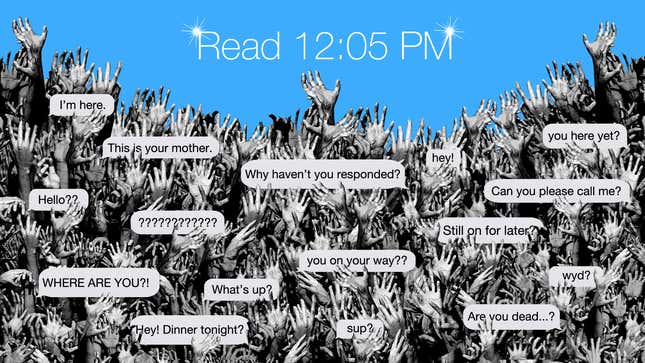
Read receipts, the small flags that pop up below texts to signal to the person texting you that you’ve read their message, are the most unfairly maligned technological innovation of our age.
Read receipts can be used for good or evil, which is part of their genius. They allow you to communicate to the people you like that you’re busy and you just haven’t seen their texts, so they shouldn’t worry. And they let you communicate to the people you don’t like that you saw their stupid text and you’re just ignoring them temporarily or forever.
Most people, inexplicably (though if forced to offer an explanation, I’d blame cowardice), do not like or use read receipts. An opponent of read receipts might say “Great, just what we need more of in this technological age: Another extra-textual indication of meaning to obsess over,” or “Read receipts are the province of lunatics who don’t understand that there’s a social contract to uphold,” or “I’d look more kindly on you if I found out you tortured animals,” “I would never date anyone who has read receipts on,” or “You’re a sociopath.”
These arguments would be wrong, wrong, sick, short-sighted, and irrelevant. All of them were real arguments made by my coward co-workers.
Read receipts end the guessing game that is modern digital communication. Instead of stressing about if someone has read your text or not, you know. If you’re so inclined, you can occasionally check in to see if the text has been read, but you can go about your day unencumbered by uncertainty. If the person read the text and does not respond, you are similarly freed from worry. You know they read your message and are ignoring you, in which case you can go about you day, maybe a little bit sad, but firm in the knowledge that the person is no longer worth your time. Or you know they read your message and didn’t have time to respond, in which case they can explain themselves to you later— “Sorry, I was running to a meeting,” “Oops, I was in the subway,” “My bad, I was about to go meet up with my side piece”—and you can choose whether you believe them.
Read receipts demand accountability. Knowing that the person on the other side of my small, maddening screen can see when I have read their texts incentivizes me to be smart about when I look at my phone. For example, if I’m in the middle of something at work, I’m not going to be scrolling through my text messages because if I read a text message and if it’s from a person I like, I will feel obligated, out of consideration and human decency to respond, and then it will distract me from very important blogs like this one. Get read receipts and you’ll be more productive, because now mindlessly reaching for your phone threatens to become a commitment. Unplug once in a while—your text partners will be happier and you will be too.
The informed consumer is a better consumer. The informed texter is a better communicator. Read receipts are the information you need to make smart choices about communication. In his recent screed against read receipts, my colleague Drew Magary wrote that “in the digital world, silence is POWER, baby.” Wrong. KNOWLEDGE is power. KNOWLEDGE comes from turning your damn read receipts on.
If this isn’t enough to convince you—maybe you’re a cool person and say “I do not worry if my text has not been read. If you do not read it, it is your loss”—the evil side of read receipts may have more appeal for you. Be a huge dick. Straight-up read someone’s text and then ignore it, knowing that they know you’ve read it. I think this this should be used sparingly, because I am a nice person (for evidence, I use read receipts to be considerate), but it is another weapon in your digital arsenal for the war that is interpersonal relationships.
Here are a few testimonials from read receipt users:
Tommy Craggs, Former Executive Editor of Gawker Media:
“I support transparency in all things, and I like that an observed non-response is itself a form of response. A soft ‘fuck you,’ basically. I am also too lazy to change any factory defaults but not so lazy that I won’t spend my time building elaborate ideological justifications for my laziness.”
Kyle Wagner, Senior Writer at FiveThirtyEight:
“They’re useful for a few reasons, all relating to not wanting to be bothered or avoiding your editors. First, as simple plausible deniability. We all know every text is read as it comes in, but if I don’t trigger the alert, hey, maybe I was eating, or watching a movie, or am on the train, and maybe you’ll believe that I continued doing those things for the next 15 hours.
“Second, as a basic conversational utility — when a conversation ends and you read and don’t reply, you let the other person know you’re done for now. Last, as psychological warfare. The rudest move I have in my text message arsenal is the weaponized read receipt: Read a message from someone trying to get in touch and never reply. This last one is generally reserved for breakups or family business, but can serve in an editor fight if necessary.”
Max Read, Senior Editor at New York magazine:
“Only cowards don’t use read receipts.”
There is a small but resolute group of read receipt users out there and it is my hope that our ranks will grow as more people reach enlightenment. Until then, keep texting responsibly and considerately and maybe sometimes like an asshole but only when it’s warranted. In fact, the only better alternative to using read receipts would be to stop texting people altogether and move to the desert. That’s acceptable, too.